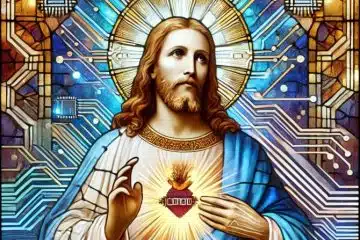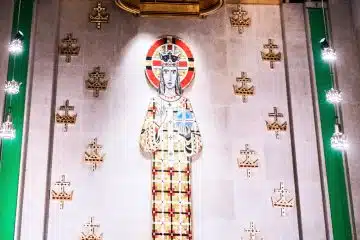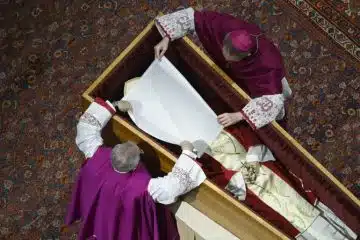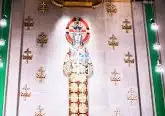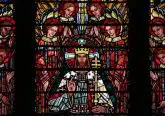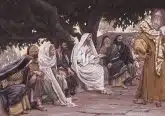A Closer Look: Christ the King of Individuals & Nations, of Time & Eternity
On Nov. 24 this year, the universal Church celebrates the Solemnity of Our Lord Jesus Christ, King of the Universe, more commonly known as the Feast of Christ the King. Pope Pius XI instituted this feast in Dec. 1925 by the promulgation of his encylical, Quas Primas, written in the wake of the moral devastation of WWI and during the rise of dangerous nationalism. He instituted the Feast of Christ the King to remind Christians that the sovereignty of Christ encompasses all aspects of our lives –personal and political, temporal and eternal.
Originally celebrated on the last Sunday of October, St. Pope Paul VI moved the feast to the final Sunday of the liturgical year in 1970. A closer look at Quas Primas and the later movement from the feast’s original date to the last Sunday before Advent, provide valuable insights about the sovereignty of Christ over all aspects of our lives, the danger of nationalist idolatry, and the eschatological significance of the feast.
Manifold Evils in the World
Quas Primas begins by pointing out the chief causes of the “manifold evils in the world” were that the majority of people had “thrust Jesus Christ and his holy law out of their lives,” both in private and political affairs. While Christ is to rule over the hearts, minds and wills of individuals, Pope Pius reminds us that as long as states refuse to submit to the sovereignty of Christ, “there would be no really hopeful prospect of a lasting peace among nations.”
These are difficult words for those of us who live in a secular democracy, in which church and state are considered separate. We cannot envision a scenario under which the United States would confess Christ as King and submit to His authority. That does not mean, however, that we should dismiss this important teaching as irrelevant to the American experience. On the contrary, the call for states to submit to the sovereignty of Christ is a reminder that our primary citizenship – and thus our primary allegiance – is not to the U.S. or its flag, but rather to Christ and His Kingdom. While the U.S. might not submit to the sovereignty of Christ, we Catholic Christians must order our political lives in such a way that“Christ and his holy law” have primary purchase over our moral and political commitments.
Our Citizenship
In other words, the call even for states to submit to the sovereignty of Christ is a warning to avoid all forms of idolatry. By celebrating the Feast of Christ the King, we remind ourselves that our primary identification is not as citizens of a temporal and highly imperfect regime, but as citizens of an eternal and perfect Kingdom. When we forget this – that is, when we put national identification and loyalty above Christian discipleship – we commit the sin of idolatry no less than if we bow to a statue of Buddha or Baal. In fact, the temptation to idolatry through nationalism is even more insidious than these obvious forms of idolatry in which no Christian would think of engaging. That is because, while we must not make an idol of national loyalty, we are not required to renounce earthly citizenship.
The delicacy of this balance is illustrated in an important second-century Christian apologetic letter, “The Epistle to Diognetus,” describing the difficulty that Christians faced in hostile political environments. “They dwell in their own countries, but simply as sojourners,” says the author. “As citizens, they share in all things with others, and yet endure all things as if foreigners. Every foreign land is to them as their native country, and every land of their birth as a land of strangers.” Christians are citizens of their native lands. But the commitments of that temporary citizenship are secondary, subordinated to their primary recognition of Christ the King. In this sense, we are, to some extent, strangers in our homeland, called to chasten national loyalty with Christian commitment. We cannot put a law, a nation, a party or a politician before Christ the King. Where a conflict arises, we must subordinate the demands of temporary worldly citizenship to the rule of the eternal Kingdom of Christ.
Witnesses for the Kingdom
By doing so, we are witnesses to the world of a higher Kingdom, a better law and eternal peace. As Quas Primas puts it, “When once men recognize, both in private and in public life, that Christ is King, society will at last receive the great blessings of real liberty, well-ordered discipline, peace and harmony.” By our own witness to Christ as King, we declare to the world that “In him is the salvation of the individual, in him is the salvation of society.”
And, of course, the advent of this eternal salvation is the coming of Christ the King, in the form of a human, in the form of a child. By moving the feast to the end of the liturgical year, and thus the final Sunday before Advent, St. Paul VI wanted to symbolize the totality and perpetuity of the Kingdom of Christ. Christ is King over all things and for all time. “If the Kingdom of Christ receives all nations under its way… we may be rendered partakers of eternal bliss and glory with him in his heavenly kingdom.”




